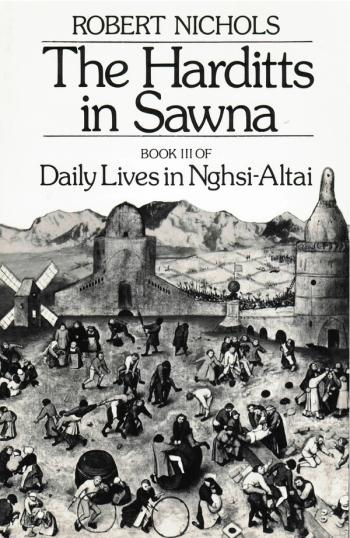The Harditts in Sawna is the third volume of Robert Nichols’s utopian tetralogy, Daily Lives in Nghsi-Altai. In the previous books (Arrival and Garh City), we were treated to tantalizing glimpses of the imaginary central Asian country of Nghsi-Altai seen through the eyes of three travelers from the West, followed by an investigation of the city in a technologically advanced society which yet maintains an elaborate, “primitive” kinship system. We now turn to six narratives of village life, focusing on members of the Harditt family. Maddi, a twelve-year-old schoolgirl; Dhillon, a farm apprentice; his married older brother, Srikant––these are the Harditt children of earlier volumes. “Women in Middle Age” tells of Sathan, their mother, and Nanda, their aunt, and the workings of the matriarchy in Sawna. An account is then given of the death of the grandfather, Old Harditt, and his translation into the family’s Ancestor Society. And finally, we see Venu, Sathan’s husband, as an elected official of the Wind Brotherhood of solar engineers. These are not, however, tales of individuals in the usual sense but probes in the web of relationships that constitutes a communal society, the widening circle of clan, tribe, and phratry. Each story, moreover, reveals an aspect of a delicate political-industrial balance––for the world of Nghsi-Altai is modern, indeed a paradigm of an alternate society.



